|
|
|
Sort Order |
|
|
|
Items / Page
|
|
|
|
|
|
|
| Srl | Item |
| 1 |
ID:
075658
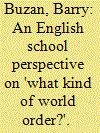

|
|
|
| 2 |
ID:
131995


|
|
|
|
|
| Publication |
2014.
|
| Summary/Abstract |
Within the scholarly debate on the current power transition in the international system, particular importance is attached to China's economic rise and the global shifts it is bringing forth in material primacy. A thorough understanding of these shifts in the relative distribution of power, however, requires leaving the narrow path of material capabilities and looking at normative accounts as well. Taking up this challenge, the article focuses on the political dimension of China's rise by exploring the country's alignment with South American governments along two dimensions: the convergence of their foreign policy ideas and the provision of diplomatic links facilitating their cooperation and coordination in global politics. The empirical analysis depicts a nascent global agenda forming between China and certain South American countries and shows that, along with growing levels of foreign policy compatibility, China has also advanced its diplomatic inroads into the region, particularly at the level of bilateral relations. Taking these developments as a whole, it is suggested that China has gained international attraction in terms of its visions of global order and as a potential political partner throughout the region. The article concludes with a discussion of the findings in light of the ongoing relative shifts in the distribution of global power beyond material primacy, and the prospects for China's further political rise.
|
|
|
|
|
|
|
|
|
|
|
|
|
|
|
|
| 3 |
ID:
180284
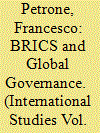

|
|
|
|
|
| Summary/Abstract |
This article analyses the role played by the Brazil, Russia, India, China and South Africa (BRICS) countries within the context of the reform of international institutions, in primis the United Nations Security Council (UNSC). In recent years, the new emerging powers, among which the BRICS occupy a central position, have instigated a paradigm shift in international relations and global governance (GG). Furthermore, some scholars argue that the BRICS could inaugurate a new world order. Since the United Nations (UN) is one of the institutions in which these changes need to be more broadly reflected due to its global projection, it is doubtful if the BRICS will be able to bring about its reform. In fact, several debates were conducted about the need to reform the UN and, in particular, the Security Council (SC). In order to do this, the article examines the interests of the BRICS countries, within the group itself, and their vision for the UNSC. Only a common vision within the group could have specific effects in reforming the UNSC, thus giving a new shape to GG, which may not be possible. There are several obstacles from within the BRICS itself in this regard, despite the fact that during their summits, they have repeatedly called for the UN reforms.
|
|
|
|
|
|
|
|
|
|
|
|
|
|
|
|
| 4 |
ID:
192891
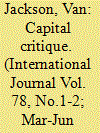

|
|
|
|
|
| Summary/Abstract |
Advocates of progressive political economy agree that the neo-liberal economic order has worsened environmental degradation, worker precarity, and oligarchy, but what are the alternatives? This article relates left-progressive discourses about concrete approaches and policy ideas to implications for the global economic order. While progressives explicitly seek a more social democratic global order, the various policy initiatives in the progressive imaginary implicitly involve approaches to order-building that are in scarcely acknowledged competition with one another. While neo-Keynesianism, justice for the Global South, a Global Green New Deal, and degrowth are all anti–neo-liberal approaches that pursue the same broad aims—reducing inequality within the Global North, raising standards of living and buffering structural violence in the Global South, and responding to the climate crisis—these goals potentially exhibit the tensions of a trilemma.
|
|
|
|
|
|
|
|
|
|
|
|
|
|
|
|
| 5 |
ID:
120517
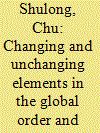

|
|
|
| 6 |
ID:
098080
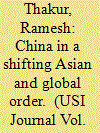

|
|
|
| 7 |
ID:
139595
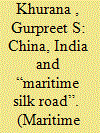

|
|
|
|
|
| Summary/Abstract |
In the coming years, the texture of China–India relations will be a crucial determinant of the geopolitical, economic and security environment of Asia, with a strong impact on the global order. Both countries have lately emerged as major economies. This has led to a dilation of their areas of maritime interest, and thereby a growing China–India interface at sea. This may be accompanied by both opportunities and challenges. Given the dynamism of recent developments, these need to be continually assessed and appraised as inputs for policy making. Among the most significant developments is China's “Maritime Silk Road” (MSR) initiative. In context of this development, this paper attempts to examine the convergences and divergences between China and India. While the bilateral divergences may continue to persist, the paper attempts to assess whether the two countries could capitalize upon the convergences to seize the opportunities presented by the MSR.
|
|
|
|
|
|
|
|
|
|
|
|
|
|
|
|
| 8 |
ID:
144204
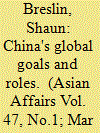

|
|
|
|
|
| Summary/Abstract |
Whilst there is a general acceptance amongst Chinese analysts that the country's global power has really increased (and for very good reasons), how best to use this power to generate real change in the global order remains a subject of considerable debate. The nature of that international order itself is a key determinant of what China can do. On one level the rise of new powers is leading to a depolarised order with fluid and changing alliances that create possibilities for China to build partnerships for change. But on another level, the residual power of the US creates clear limits on what can be done. This creates a rather unique set of circumstances where a partially dissatisfied rising power has to try to find ways to responsibly change (but not fracture) the existing system as self-perceived No.2, with the No.1 rather reluctant to accept the No.2's agenda.
|
|
|
|
|
|
|
|
|
|
|
|
|
|
|
|
| 9 |
ID:
193138
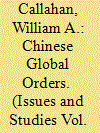

|
|
|
|
|
| Summary/Abstract |
While many use rational IR theory to explain Chinese foreign policy behavior, this paper follows global IR to employ interpretivist theory to examine how Chinese elites understand their country’s role in the world. In particular, it explores the Chinese global order ideas of socialism, tradition, and nation through a comparative analysis of how they work in China–Russia relations, especially after China’s 20th Communist Party Congress in 2022. The first section presents a critical analysis of the realist understanding of the China–Russia–U.S. strategic triangle. It argues that the socialist concept of “united front work” better explains Chinese (and Russian) policy in terms of short-term “tactical triangles.” To probe China’s long-term global order ideas, the second section explores narratives of tradition to examine the concentric circles model of global order seen in Chinese tianxia and Russian Eurasianism. To understand these competing Russocentric and Sinocentric global orders, the third section explores how each country’s official historiography highlights narratives of the nation and especially how national rejuvenation requires correcting the “national humiliation” of lost territories. Rather than see these narratives in a linear chronological history — i.e., from tradition to socialism to nationalism — this paper considers how they overlap in socialism, tradition, and nation, a non-linear dynamic triad of global order ideas. It concludes first that further research is necessary to examine the interrelation of these three narratives: while nation and tradition are often employed to support the overarching narrative of socialism in recent years, this could certainly change. The conclusion then argues that while these narratives may be coherent theoretically, they have not been very successful in achieving Beijing and Moscow’s foreign policy objectives.
|
|
|
|
|
|
|
|
|
|
|
|
|
|
|
|
| 10 |
ID:
145982


|
|
|
|
|
| Summary/Abstract |
International society, so long the resolution to problems of collective political order, now appears to be failing in its capacity to deal with transnational challenges such as climate change, global security and financial instability. Indeed, the structure of international society itself has become a significant obstacle to such pressing issues of global governance. One striking response has been the reemergence of cities as important actors on the international stage. This article will show how these two issues are intrinsically linked. Cities have taken on new governance roles in the gaps left by hamstrung nation-states, and their contribution to an emerging global governance architecture will be a significant feature of the international relations of the 21st century. But do the new governance activities of cities represent a failure on the part of states, as some scholars have argued? Or are they a part of an emerging form of global order, in which the relationship between states, cities and other actors is being recalibrated? This article argues that the remarkable renaissance of cities in recent decades has been a result of a shift in the structure of international society, and assesses the causal drivers of this shift. It goes on to draw out some of the implications of the recalibration of the relationship between the city and the state for how we understand the emerging form of global order.
|
|
|
|
|
|
|
|
|
|
|
|
|
|
|
|
| 11 |
ID:
108966
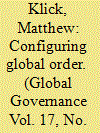

|
|
|
| 12 |
ID:
163198
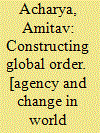

|
|
|
|
|
| Publication |
Cambridge, Cambridge University Press, 2018.
|
| Description |
xiii, 215p.: figures, tablespbk
|
| Standard Number |
9781316621783
|
|
|
|
|
|
|
|
|
|
|
|
Copies: C:1/I:0,R:0,Q:0
Circulation
| Accession# | Call# | Current Location | Status | Policy | Location |
| 059582 | 341.2/ACH 059582 | Main | On Shelf | General | |
|
|
|
|
| 13 |
ID:
173583
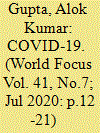

|
|
|
|
|
| Summary/Abstract |
In 1918, the Spanish Flu infected 500 million people globally, when the world’s population was just 1.8 billion. The pandemic claimed the lives of 50 million people—14 million to 18 million of them in India alone.1It means ten percent of the population was eliminated by the flu from planet earth. The world was different then. Weapons and technology have not yet substituted or replaced human beings.
|
|
|
|
|
|
|
|
|
|
|
|
|
|
|
|
| 14 |
ID:
181686
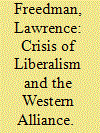

|
|
|
|
|
| Summary/Abstract |
Liberalism as the ideology of the Western alliance is in crisis. Having seen off Nazism and communism, it gained influence after the end of the Cold War, which produced optimism about security, human rights and global prosperity. Now liberalism, shaken by the financial crisis and the wars in Afghanistan and Iraq, is in retreat. Illiberal states, notably China and Russia, are reshaping the international system. Liberalism may not be able to continue to bind allies together, or enable them to cooperate effectively in a severe crisis. There are three counters to a gloomy prognosis, however. Firstly, heightened great-power competition has reinforced rather than undermined the alliance. Secondly, Russia and China have no substantial alliances, and are showing that authoritarian governments face serious problems of their own, including entrenched leaderships. Thirdly, liberalism remains better equipped to adapt to new circumstances.
|
|
|
|
|
|
|
|
|
|
|
|
|
|
|
|
| 15 |
ID:
095616
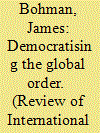

|
|
|
|
|
| Publication |
2010.
|
| Summary/Abstract |
While there is much discussion of the need for democracy in transnational institutions, there is less discussion of the conditions for their democratisation. To address this deficit, a general account of democratisation is necessary. I propose that democratisation is dependent on the joint realisation of two conditions: communicative freedom and communicative power. Democratisation thus requires, first, publics and associations in which communicative freedom is realised on the one hand; and, second, institutions that link such freedom to the exercise of communicative power to decision making on the other. In order for these conditions to be met, civil society must be expanded into the public sphere. The transformation of communicative freedom into communicative power can be promoted only by institutions that recognise the decisional status of publics, which in turn depend on civil society to generate the deliberative benefits of the plurality of perspectives. Communicative power is not merely spontaneously generated through publics, but also through publics expressly formed through democratic institutional design.
|
|
|
|
|
|
|
|
|
|
|
|
|
|
|
|
| 16 |
ID:
137601
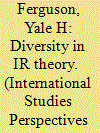

|
|
|
|
|
| Summary/Abstract |
Rather than dead or even moribund, International Relations (IR) theory is most certainly “alive,” although of course exactly how “well” remains a matter for debate. This article explains that each of the traditional and more recent “schools” of theory has its important strengths and serious weaknesses. Some theories are more appropriately applied to particular problems than to others. Analysts need to be conversant with a wide range of theories so they can recognize them when they are being employed (even only implicitly) and also use them as a toolkit when developing a research subject or explanations for patterns observed. Viewing some subjects simultaneously from more than one theoretical perspective often enhances understanding.
|
|
|
|
|
|
|
|
|
|
|
|
|
|
|
|
| 17 |
ID:
177653
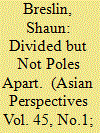

|
|
|
|
|
| Summary/Abstract |
While differences remain, the gap between US and European debates over the likely impact of China’s rise on the
global order has narrowed in recent years. At the same time,
China’s leaders have been more confident in establishing
dichotomized distinctions between their view of how the
world should be ordered and how China will act as a great
power on one hand, and what they depict as the West’s preferences and the typical modus operandi of Western powers
on the other. Despite evidence of ever clearer dividing lines
between different visions of China’s impact on the future of
the global order, this is not the same as a return to bipolarity. The problems of disentangling transnational economic
relations, different levels of followership for potential leaders, and pragmatic considerations of governance efficacy in
diverse issue areas all suggest something other than fixed
bloc-type alliances on either side of a bipolar divide.
|
|
|
|
|
|
|
|
|
|
|
|
|
|
|
|
| 18 |
ID:
134038
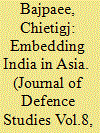

|
|
|
|
|
| Publication |
2014.
|
| Summary/Abstract |
The emergence of the Indo-Pacific as a new geopolitical frame ofreference is embedded in the growing strategic importance of themaritime domain and the rise of states that have demonstrated theability to 'transcend' their respective subregions. However, the Indo-Pacific remains a concept in its infancy, as evidenced by the fact that itcontinues to compete with alternative conceptions of regional space inAsia. This article argues that India has a vested interest in the survival ofthis new strategic geography as it serves to reinvigorate the momentumof its post-Cold War re-engagement with Asia under the aegis of its 'LookEast' and 'extended neighbourhood' policies. In this context, India shouldcontinue to cultivate the Indo-Pacific concept and ensure its embrace inthe region's evolving strategic vocabulary.
|
|
|
|
|
|
|
|
|
|
|
|
|
|
|
|
| 19 |
ID:
128742
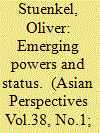

|
|
|
|
|
| Publication |
2014.
|
| Summary/Abstract |
Why did the leaders of four very different countries-Brazil, Russia, India, and China-decide to hold a summit in 2009 in Yekaterinburg, thus transforming "the BRICs" from a financial category into a political grouping? I argue that the main driver for the first summit to take place and succeed was to strengthen each member country's international status. The 2009 BRICs summit was successful in that it led to the birth of a political platform during highly unusual international economic and political circumstances. In a global economy in the midst of a recession and widespread uncertainty, the BRICs' relative economic stability and capacity to respond to the crisis was decisive and lent credibility to their call for reform of the international system. The United States' temporarily reduced legitimacy also provided a window of opportunity for emerging powers to act as aspiring guarantors of stability in tomorrow's world. While measureable gains from cooperation and stronger rhetoric that delegitimized the global order did occur in the following years, they were not the primary drivers for the first summit to take place and succeed.
|
|
|
|
|
|
|
|
|
|
|
|
|
|
|
|
| 20 |
ID:
066037
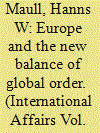

|
|
|
|
|
|
|
|